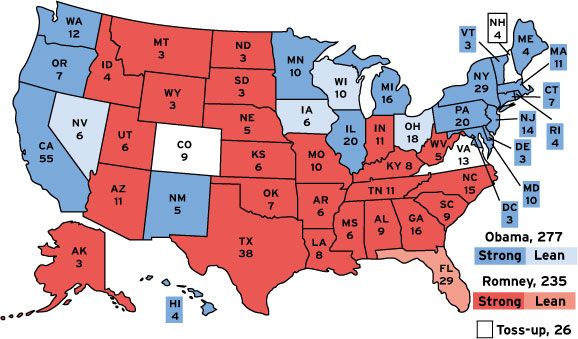Our Forecast: Obama Likely To Win
Romney closed the gap but the electoral map still works against him as Election Day draws near.

Profit and prosper with the best of Kiplinger's advice on investing, taxes, retirement, personal finance and much more. Delivered daily. Enter your email in the box and click Sign Me Up.
You are now subscribed
Your newsletter sign-up was successful
Want to add more newsletters?

Delivered daily
Kiplinger Today
Profit and prosper with the best of Kiplinger's advice on investing, taxes, retirement, personal finance and much more delivered daily. Smart money moves start here.

Sent five days a week
Kiplinger A Step Ahead
Get practical help to make better financial decisions in your everyday life, from spending to savings on top deals.

Delivered daily
Kiplinger Closing Bell
Get today's biggest financial and investing headlines delivered to your inbox every day the U.S. stock market is open.

Sent twice a week
Kiplinger Adviser Intel
Financial pros across the country share best practices and fresh tactics to preserve and grow your wealth.

Delivered weekly
Kiplinger Tax Tips
Trim your federal and state tax bills with practical tax-planning and tax-cutting strategies.

Sent twice a week
Kiplinger Retirement Tips
Your twice-a-week guide to planning and enjoying a financially secure and richly rewarding retirement

Sent bimonthly.
Kiplinger Adviser Angle
Insights for advisers, wealth managers and other financial professionals.

Sent twice a week
Kiplinger Investing Weekly
Your twice-a-week roundup of promising stocks, funds, companies and industries you should consider, ones you should avoid, and why.

Sent weekly for six weeks
Kiplinger Invest for Retirement
Your step-by-step six-part series on how to invest for retirement, from devising a successful strategy to exactly which investments to choose.
A bitterly divided nation seems set to give Barack Obama a second term as president. This isn’t an endorsement, just straight talk from the Oct. 26 issue of The Kiplinger Letter about the likely outcome, based on an analysis of polls, party breakdowns from states with early voting, and interviews with campaign operatives and officials in key states.
Though Romney narrowly tops some national polls, Obama leads the race for electoral votes, and those 51 separate elections -- in 50 states and the District of Columbia -- will determine who will be sworn in as president on January 20.
Romney’s momentum is slowing after a run of several weeks that allowed him to close the gap in several key states. It can swing his way again, but a renewed surge this close to Election Day would be unusual unless Obama commits a big blunder or a major event raises new doubts about him.
From just $107.88 $24.99 for Kiplinger Personal Finance
Become a smarter, better informed investor. Subscribe from just $107.88 $24.99, plus get up to 4 Special Issues

Sign up for Kiplinger’s Free Newsletters
Profit and prosper with the best of expert advice on investing, taxes, retirement, personal finance and more - straight to your e-mail.
Profit and prosper with the best of expert advice - straight to your e-mail.
For now, give Obama 277 electoral votes in 22 states and D.C. -- seven more than the 270 he needs to clinch the election.

That includes the key prize, Ohio. Some polls still show a close race for the state’s 18 electoral votes, but concerns about the auto industry and stout turnout among Democrats during early voting is likely to leave Romney trailing by a narrow margin.
Most of Obama’s success is in the Northeast and the Pacific Northwest, with a safety net in the Upper Midwest. He’s big in Minnesota, Illinois and Michigan, the state where Romney was born.
Give Romney 235 electoral votes in 25 states, with 26 votes still up for grab in three states: Virginia, Colorado and New Hampshire. He’s solid in most of the Plains states, the Mountain states and throughout much of the South.
A week ago, a path opened up for Romney to win. Without Ohio, that path to victory is a long shot. He needs to win all three toss-up states and overtake Obama in Wisconsin. That scenario would give him 271 electoral votes to Obama’s 267.
Romney would also win if the electoral votes added up to a 269-269 tie. The election would be thrown to the 2013 House to decide by casting one vote per delegation, based on which party holds the most seats in that state. Republicans will have a clear edge, but an electoral vote tie is highly unlikely.
If Obama holds on, this year’s focus on early voting will be the deciding factor. Indeed, Romney will win the Election Day vote in Ohio, Iowa and other states. But Obama racked up huge leads over Romney among those voting before Nov. 6, and that will give him the advantage in key states when all ballots are counted. In some states, early voters will account for a fifth or more of the turnout, and many of those votes were cast before Romney’s post-debate surge kicked in.
Republicans privately acknowledge the superiority of Obama’s get-out-the-vote effort. It’s most obvious now in states with early voting, but it will also help the president on Election Day in Pennsylvania and other states that Romney may need to flip to win.
Large Hispanic populations in key states give another nudge to Obama. Hispanics make up more than a quarter of the voting-age population in Nevada, which leans toward Obama, and Colorado, which is up for grabs. Obama will carry 60% or more of Hispanics who vote.
It’s true that an Obama victory will frustrate, or even anger, nearly half of the voters in the U.S. But here’s something to keep in mind: The outcome won’t make a huge difference either way. There are vast disagreements between the candidates on some important issues, but outside of potentially shaping the Supreme Court, whoever is president won’t have much latitude to drive the national agenda, because Congress will still be closely divided.
The House will stay in GOP hands, and Democrats are poised to keep the majority in the Senate.
The bottom line: There’ll be no mandate for the next president, though he’ll try to claim one. With a split Congress and an angry electorate, divisiveness will continue to dominate both ends of Pennsylvania Avenue.
Senior Associate Editor Richard Sammon and Associate Editor Kenneth R. Bazinet contributed to this report.
Profit and prosper with the best of Kiplinger's advice on investing, taxes, retirement, personal finance and much more. Delivered daily. Enter your email in the box and click Sign Me Up.

-
 Quiz: Do You Know How to Avoid the "Medigap Trap?"
Quiz: Do You Know How to Avoid the "Medigap Trap?"Quiz Test your basic knowledge of the "Medigap Trap" in our quick quiz.
-
 5 Top Tax-Efficient Mutual Funds for Smarter Investing
5 Top Tax-Efficient Mutual Funds for Smarter InvestingMutual funds are many things, but "tax-friendly" usually isn't one of them. These are the exceptions.
-
 AI Sparks Existential Crisis for Software Stocks
AI Sparks Existential Crisis for Software StocksThe Kiplinger Letter Fears that SaaS subscription software could be rendered obsolete by artificial intelligence make investors jittery.
-
 Kiplinger's 2020 Election Forecast
Kiplinger's 2020 Election ForecastPolitics For nearly a century, The Kiplinger Letter has forecasted the outcome of presidential elections to keep readers informed of what's coming and what it means for them. Here's our call for 2020.
-
 How the GOP Tax Bill May Affect Businesses
How the GOP Tax Bill May Affect BusinessesBusiness Costs & Regulation Corporations would enjoy a lower flat tax rate while individual owners of pass-throughs would also see a lower rate, but with more complex terms.
-
 The Long Slog in Congress After Comey
The Long Slog in Congress After ComeyPolitics Trump's firing of the FBI director ruffled congressional feathers, but not enough to spur an independent investigation into Russian meddling in the 2016 U.S. election.
-
 Trump’s Tax Reform Plan Faces Tough Challenges
Trump’s Tax Reform Plan Faces Tough ChallengesPolitics A one-page outline isn't enough to satisfy a Congress interested in the details — and protecting constituents.
-
 Trump's Agenda and Challenges
Trump's Agenda and ChallengesPolitics What lies ahead for the President-Elect.
-
 Clinton on Track to Win 2016 Presidential Election
Clinton on Track to Win 2016 Presidential ElectionPolitics Trump can win the White House, but faces an uphill climb.
-
 New Overtime Rules Will Hit Businesses This Year
New Overtime Rules Will Hit Businesses This YearBusiness Costs & Regulation A change in salary threshold will make more workers eligible for extra pay.
-
 Bumpy Road Ahead in 2016 Presidential Race
Bumpy Road Ahead in 2016 Presidential RacePolitics Trump will get a bounce after the Republican convention, but Clinton is poised to regain ground.